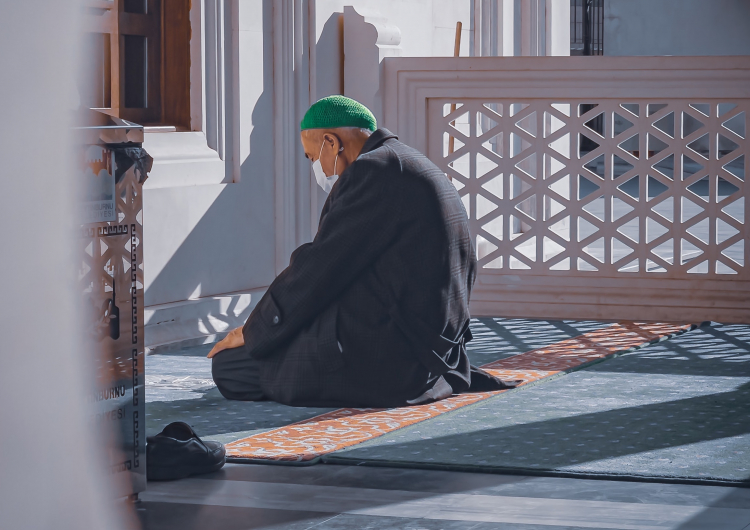Ramadan Around the World During the Pandemic

Ramadan, or Ramazan, is considered one of the holiest months of the year for Muslims all over the world. Ramadan is something like Christmas for Christians or Rosh Hashanah for Jews. The purpose of the month is to commemorate the revelation of the Qur’an, practice self-control, gratitude, and compassion towards the less fortunate. During this month, Muslims refrain from food and drinks during the sunlit hours, or in other words, they fast.
The duration of refraining depends on the country you live in. For example, in some countries, fasting hours last 13-14 hours, while in others, fasting lasts 11 hours daily. Fasting (Sawm) is also one of the five main pillars of worship in Islam along with the testimony of faith (Shahadah), prayer (Salah), charity (Zakah), and pilgrimage (Hajj). However, some Muslims fast not only for "requirement" purposes.
Sabika Haji Djivan, a sophomore student at AUP, has been fasting since she was 9. "I fast not only because I have to, but because I want to bring a change," says Djivan. For her, fasting is of spiritual character. "During Ramadan, you question how you behave. You try to become a better person because of all the time you have for self-reflection," she says. Like many Muslims, Djivan agrees that this month is not about fasting, it is about the spirit that pushes you to become a better person.
This year, Ramadan started on April 13 and ends on May 12. Iftar, an evening meal with which Muslims end fasting every day during Ramadan, is usually spent with family and friends. However, due to restrictions applied to avoid crowds and the spread of the virus, many traditions had to be altered by authorities, which changed accustomed routines.
For example, instead of going to the mosque for prayer, Muslims in some countries would have to pray online. Yes, you have read that correctly. Technology has reached religion now, too. "In Islam, the prayer has two parts. The first part is teaching and preaching by the imam while the believers listen," Sheikh Mohammed Abu Zaid, the chairman of the Sunni Court and imam of the largest mosque in the Lebanese city of Saida, told DW. "This part can be done online," he said.
However, the second part, with believers praying together and performing the ritual gathering, "cannot be done online or from a remote place." Many disagree with the idea of streaming prayers, calling it invalid. Yet, in Iran and Egypt, "online praying" seems like one of the most convenient practices for the moment. In other countries, such as Saudi Arabia and Jordan, Muslims can attend mosques following social distancing rules.
Image credit: Unsplash/Rumman AminOther important traditions include gathering and eating outs at restaurants during Iftar. While some countries eased restrictions and allowed gatherings, others such as Bangladesh, enforced a strict lockdown for one week. For some people, it is a very sorrowful thing to accept since praying and feasting together are one of the important and delightful parts of Ramadan. Sharing and giving are what are truly important. Djivan emphasizes the acute difference in Ramadan before and after the pandemic. "Feeling is not the same. Before, we used to celebrate every evening in a mosque with like 500 hundred people, but now it is limited to six and at home."
Indeed, it is challenging to get used to the feeling of absence of people. Magdy Hafez, a 68-year-old Egyptian also emphasizes the difference. "I have been going to the mosque for 40 years so it was definitely a very, very, difficult thing," he said. “But our religion orders us to protect one another." Nevertheless, "It’s a whole other feeling, and the spirituality in Ramadan is like nothing else," says Hafez.
Canada has changed its approach towards social gatherings. Hassaan Shahid, a Canadian activist, created a platform for people to break their fast together every day by using #VirtualRamadan: "Those who are breaking their fast will come together on a video call and kind of talk about their day, talk about how their experience has been fasting,” Shahid said. “It's a sense of community and a sense of a gathering that we want to give to people, albeit virtually," Shahid continued.
In light of #COVID19 , the Ahmadiyya Muslim Jama`at Canada has launched the National #VirtualRamadan Campaign to allow Canadians an opportunity to experience #Ramadan while #SocialDistancing.
Sign up on https://t.co/68q23tKVZY & share your experience by using #VirtualRamadan pic.twitter.com/tlmsbZKf30— Virtual Ramadan (@VirtualRamadan) April 12, 2021
It is truly amazing that people, despite all challenges, still try to find ways to adjust and to stay loyal to their faith. Some people even find ways to fulfill another important pillar of Ramadan, which is charity. In many countries, for example, mosques will continue distributing meals to families in need. Nisa Homes, a non-profit charitable group providing safe havens and support services to women and families experiencing homelessness, raises money during this month to build a shelter in Montreal, Canada.
Zainab Ibrahim, a manager of the Vancouver location, says, "Charity and giving to others especially during the month of Ramadan is extremely important… part of fasting is putting yourself in the shoes of others who don’t necessarily have access to the basic necessities."
The coronavirus pandemic is disturbing, but it is possible to find a way around it. Many of the above examples proved that Ramadan is more than just fasting, It is about strength, infinite loyalty, and the desire to give. It is a time to become a "better person", as Djivan said. Hopefully, one day Ramadan will go back to normal and people will be able to exercise their religion to the fullest extent.








